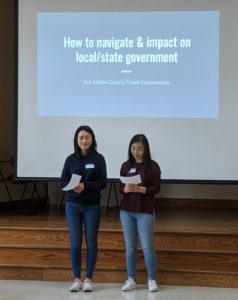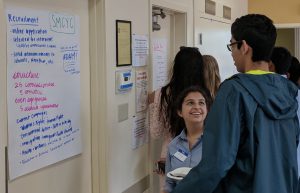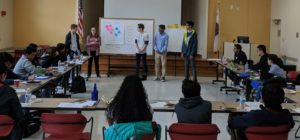“I realized that there are people like me who want to improve our society. I gained more confidence to work on my project since I know I’m not alone.” — Youth Commissioner
Last month, the San Mateo and Marin County Youth Commissions hosted the second annual Youth Commission Convening, bringing together youth commissions from across the state to discuss key issues within their communities, share best practices, and formulate a vision for strengthening the network of youth leaders throughout California.
The opportunity here is enormous.
Made up of youth between the ages 12-23 years, youth commissions act as a political voice for young people. These commissions are recognized entities of local governments, and engage with decision makers around issues that impact youth.
At the beginning of each term, youth leaders identify issues about which they are passionate and meet with community organizations to learn about ongoing efforts to address these issues. They then organize and implement social justice campaigns, which may look like drafting public policy; engaging other youth through trainings and events; and/or conducting community-wide education.
Many of these commissions have done spectacular work in their communities. Last year, the Marin County Youth Commission helped to pass a Social Host Ordinance penalizing adults who serve alcohol to minors and providing restorative justice approach to young people caught drinking. The Fresno Youth Commission successfully advocated for a $50,000 for youth jobs, established a youth jobs task force, and ensured that fees for system-involved youth were wiped from the books.
Imagine a room full of these young leaders, passionate about justice, talking shop and sharing dreams.
A Visionary Event
 At 10am, the conference room was already buzzing as commissioners representing Oakland, San Mateo, Marin, San Francisco, Sacramento, and Santa Clara toured the gallery showcasing the efforts of the commissions in each community. Keynote presenters included Peter Cerneka, Cardinal Commitment Program Director of the Stanford Haas Center for Public Service, who shared strategies on effective advocacy, and Rubi Salazar, UCLA Labor Center Immigrant Justice Fellow, who addressed immigration and the Know Your Rights campaign to protect undocumented immigrants from ICE raids. Rubi is currently interning at the Youth Leadership Institute’s San Mateo office and has been leading the charge on changing Columbus Day to Indigenous People’s Day in the county. She has also helped to establish the Immigrant Youth Award, which provides refurbished laptops to first generation immigrant youth.
At 10am, the conference room was already buzzing as commissioners representing Oakland, San Mateo, Marin, San Francisco, Sacramento, and Santa Clara toured the gallery showcasing the efforts of the commissions in each community. Keynote presenters included Peter Cerneka, Cardinal Commitment Program Director of the Stanford Haas Center for Public Service, who shared strategies on effective advocacy, and Rubi Salazar, UCLA Labor Center Immigrant Justice Fellow, who addressed immigration and the Know Your Rights campaign to protect undocumented immigrants from ICE raids. Rubi is currently interning at the Youth Leadership Institute’s San Mateo office and has been leading the charge on changing Columbus Day to Indigenous People’s Day in the county. She has also helped to establish the Immigrant Youth Award, which provides refurbished laptops to first generation immigrant youth.
As the day progressed, the commissioners broke into groups to discuss some of the most pressing issues of our time and what could be done to address them. The issues included:
- The environment: Climate change and air pollution from traffic; methane emissions from cattle and destruction ofwetlands; accountability of oil and tech manufacturers; and waste management.
- Education: The school-to-prison pipeline and restorative justice approaches; post-secondary readiness and charter schools; funding for schools and teachers, and teacher turnover; and Prop 13, which forces billion dollar companies to contribute more to public education.
- Mental health: Alcohol, tobacco and drug use; relationships and home life, school counseling and resources; and funding for sex education and inclusion of the LGBTQ+ community.
- Immigration: Transportation and housing; sanctuary cities and the Know Your Rights campaign; family separation and children entering the foster system; and fostering solidarity between immigrants from all over the world.
- Youth civic engagement: equitable access to opportunities like youth commissions; getting out the vote to young people and underrepresented communities, and lowering the voting age; and creating pathways for youth commissioners to continue working in government beyond their terms.
Their discussions explored the intersections of these challenging issues, and how they compound the impacts on the most vulnerable communities.
 The commissioners also shared best practices as well as challenges within the commissions themselves. As one youth commissioner put it, the “interpersonal connections with other youth commissioners and the reinforcement that other commissions are faced with the same issues as us” were the highlights of the event. They discussed the importance of adult allies to support youth in taking on larger leadership roles, and of utilizing the resources, knowledge, and strategies of commissions’ networks and community partners to build on efforts already taking place rather than reinventing the wheel.
The commissioners also shared best practices as well as challenges within the commissions themselves. As one youth commissioner put it, the “interpersonal connections with other youth commissioners and the reinforcement that other commissions are faced with the same issues as us” were the highlights of the event. They discussed the importance of adult allies to support youth in taking on larger leadership roles, and of utilizing the resources, knowledge, and strategies of commissions’ networks and community partners to build on efforts already taking place rather than reinventing the wheel.
They also acknowledged that many of these young people juggling school and other responsibilities — and that serving on a youth commission is a great deal of responsibility. A common challenge is absenteeism and the commissioners brainstormed about creating more accountability through a restorative lens.
As the event drew to a close, the youth focused their vision forward, sharing ideas for building on the momentum and strengthening their collaboration. Suggestions included platforms for staying connected throughout the year, holding bi-annual and regional trainings and events, reaching out to and engaging more youth commissions, and recording and/or live streaming convenings to share with those who couldn’t attend.
The big dream is to establish a statewide network of youth commissions that could tackle the key issues that surfaced during the event. With youth leaders across the state working together to bring youth voice to the decision-making table, the opportunity is, well, enormous.
The Youth Commission Convening was organized by the San Mateo and Marin County Youth Commissions, in partnership with Get Healthy San Mateo, County of San Mateo, Friday Night Live, and Safe Zone.

